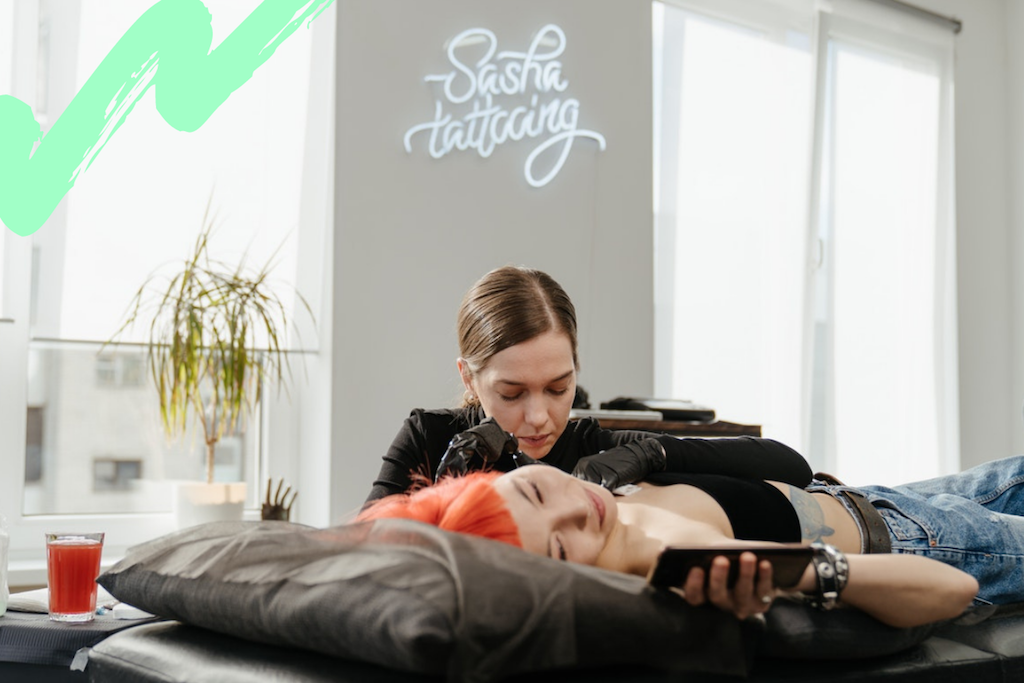Setting up your own tattoo studio in the UK is an exciting, sometimes rewarding endeavour for any aspiring tattoo artist.
Representing both the endgame of your journey to becoming a self-sufficient, creatively-free artist, and the start of a new one as a potentially successful businessperson, it’s an opportunity to showcase your skills, express your personality, and build a loyal clientele. And that’s why you got into this thing in the first place, right?
There are, however, several important factors to consider before you embark on this journey, including the equipment you’ll need and the qualifications required to open a tattoo studio legally.
Today, we’re taking you through these essential aspects, ensuring you’re well-prepared to take the plunge and establish your own successful tattoo business. So, needles at the ready, are you lying comfortably? Let’s dive in…
An Overview Of The Equipment Needed In A Tattoo Studio
Firstly, let’s look at the basic equipment required in a professional studio. There are, of course, hundreds of smaller items needed for the administrative side of things, from stationery to laptops and beyond, but these are the absolute essentials required to actually ink someone…
Tattoo Machines
Invest in a high-quality coil or rotary tattoo machine, a handheld device that holds and drives the needle and ink into the skin, to ensure precise and consistent work. You’ll need a liner machine for outlining and a shader machine for colouring and shading, too.
Power Supply
A reliable power supply unit is crucial for regulating the voltage and maintaining a steady flow of electricity to your tattoo machines.
Most tattoo machines require a voltage range of 4 to 12 volts, so you’ll want a power supply that can accommodate that range. Some power supplies offer adjustable voltage output, which can be helpful in achieving different tattooing effects.
The type of power supply is also important. Digital power supplies are becoming more popular because they offer precise control of the machine’s speed and voltage. Analog power supplies are also good options and are often more affordable.

Stencil Paper & Transfer Solution
In terms of delivering a precise tattoo, stencil paper will also be needed to transfer the design onto the skin, whilst a transfer solution is required to help transfer the design from the stencil paper to the skin.
Needles & Tubes
Purchase a variety of needles (such as round liners, round shaders, and magnums) and corresponding tubes to accommodate different tattoo styles and techniques.
Ink
Tattoo ink is a special formulation of pigments and carriers that is designed to be injected into the skin using a tattoo needle. The ink is made up of a variety of ingredients, including pigment, water, glycerin, and alcohol. The pigment is what gives the ink its colour, and the carrier is what helps the pigment stay suspended in the liquid.
Tattoo ink comes in many different colours, and artists often mix them together to create custom shades and hues. Black ink is the most commonly used colour and is made up of a combination of carbon and iron oxide. Other colours are usually made with a combination of organic and inorganic pigments.
There are also different types of ink that can be used for different skin types and tattoo styles. Some artists prefer to use vegan or organic inks that are made without animal products or harsh chemicals. UV-reactive ink is another popular option, which glows under black light.
Stock up on a wide range of professional-grade tattoo inks to cater to diverse client preferences and colour palettes.
Sterilisation Equipment
Sterilisation is a vital part of maintaining a safe and healthy tattoo studio, ensuring that all tools and equipment are free from harmful bacteria and viruses.
Autoclaves are commonly used in tattoo studios to sterilise tools and equipment. Autoclaves use high-pressure steam to kill any bacteria or viruses that may be on the equipment.
Ultrasonic cleaners are another type of sterilisation equipment used in tattoo studios. These cleaners use high-frequency sound waves to clean tools and equipment, reaching even the smallest crevices and removing any debris.
Other essential equipment includes disposable gloves, masks, and protective eyewear, which should be worn by artists and assistants during the tattooing process. Sterilisation pouches and indicators are also necessary to ensure that sterilisation has been effective.
Regular cleaning and maintenance of sterilisation equipment are also crucial. It’s important to follow manufacturers’ instructions carefully and keep up-to-date records of the sterilisation process.

Furniture
Comfortable and adjustable chairs or tables for both clients and artists are essential, along with adequate lighting and storage solutions.
Artists typically require chairs that can be adjusted and have proper lumbar support, allowing them to work for long periods without discomfort. The furniture should also be easy to clean, sturdy, and durable, with surfaces that can withstand the use of harsh cleaning chemicals.
For clients receiving their tattoo, an adjustable tattoo table or chair is going to be needed. The table or chair can be raised or lowered to accommodate the artist’s needs and allow for proper positioning of the body part to be tattooed.
Aftercare
Check out our essential tattoo aftercare tips to get a good idea of what’s required for those crucial first few days (and weeks) and getting one done.
Qualifications & Legal Requirements
Though not an exhaustive rundown of what’s required legally, the following are absolutely essential when opening a tattoo studio to ensure you don’t fall foul of the law and that you leave your clients satisfied with your work. Also to help manage bookings, records, and compliance more efficiently, many professionals use tattoo studio management software to streamline operations and stay organised.
Register With Your Local Council
In the UK, tattoo studios must be registered with the local authority, which will inspect your premises to ensure they meet health and safety standards. You’ll also need to pay a registration fee and apply for a Tattoo, Piercing and Electrolysis Licence.
Tattoo Hygiene Rating Scheme
Some councils in the UK participate in the voluntary Tattoo Hygiene Rating Scheme (THRS), which rates tattoo studios based on their hygiene practices. A high rating can boost client confidence in your business.
Tattooing Of Minors Act 1969
It is illegal to tattoo anyone under the age of 18 in the UK, even with parental consent. Ensure you implement an age verification policy at your studio.

Licences & Permits
Depending on your location, you may need additional licences or permits, such as a waste disposal permit for the safe disposal of used needles and other contaminated materials.
Training & Qualifications
While there are no specific qualifications required to become a tattoo artist in the UK, it’s highly recommended that you undertake an apprenticeship or complete a recognised tattoo course. This will not only help you hone your skills but also demonstrate your commitment to professionalism and safety. Many tattoo artists will have first studied art, too.
Insurance
Obtain public liability insurance and professional indemnity cover to protect your business from potential legal claims and financial losses.
The Bottom Line
Setting up your own tattoo studio in the UK is an exciting venture that requires careful planning, investment in quality equipment, and adherence to legal requirements. By following the guidelines outlined in this blog post, you’ll be well on your way to establishing a successful and reputable tattoo business that thrives on creativity, skill, and exceptional customer service.
And whilst we hope it will never come to this, check out this guide to some safe and effective tattoo removal methods. You know, just in case…





